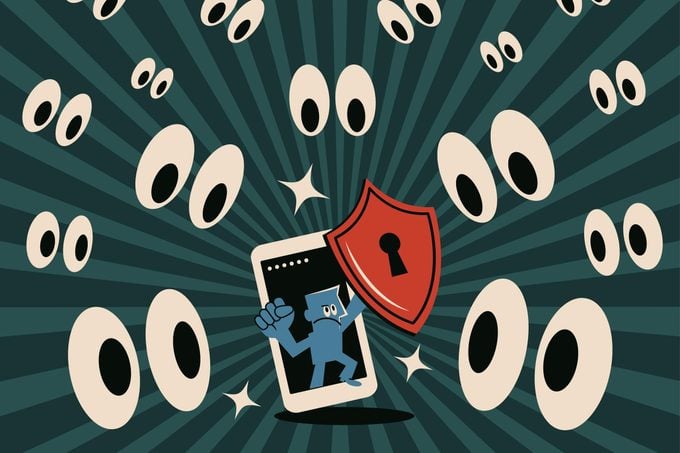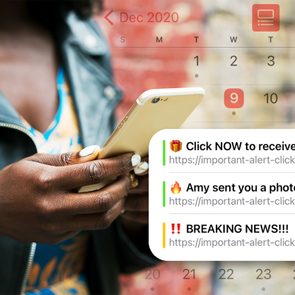How to Remove Spyware from an iPhone
Updated: Mar. 12, 2024

Someone might be spying on you right now. These simple steps will get rid of spyware on your iPhone and kick the hackers to the curb.
You may know how to tell if your computer has been hacked and even if someone is spying on your iPhone, but do you know how to remove those problematic phone apps and other mobile security threats? It’s essential that you do, because spyware and stalkerware are apps and software that literally spy on your activity. From stealing your passwords and banking information to keeping track of your location, these sneaky tools can let thieves, exes and stalkers gain access to your private information. Here’s how to boost your online security by banishing stalkerware and spyware on iPhones in just minutes.
Don’t have an iPhone? We have tips for removing spyware on Androids too.
Can someone spy on my iPhone without touching it?
Yep. Hackers can put phone spyware or stalkerware on your phone from anywhere in the world. All they need is an internet connection and a sneaky way to get you to interact with their code. Why do hackers use spyware and stalkerware? There are a variety of reasons, but some of the most common are cyberstalking, identity theft, blackmail and data theft.
In case you’re wondering, stalkerware and spyware aren’t viruses. They’re all malware (malicious software), but the difference is that viruses replicate, while spyware doesn’t. Despite the rumors, iPhones can get viruses, so you should install antivirus software on your device as well.
How did spyware get on my iPhone?
We hate to break the news to you, but there’s a good chance you accidentally clicked on a bad link, which allowed the spyware to creep into your iPhone. “Many times, spyware is installed through phishing links sent through SMS. Clicking on the link takes you to a ‘drive-by download’ site that surreptitiously installs the spyware on your phone,” explains Craig Lurey, chief technology officer and cofounder of Keeper Security. “Other times, apps that contain spyware make it into the Apple Store.”
And it’s not just mysterious strangers who might want to hack your phone. Sometimes, the hacker can be someone you know, and even love. Parents, partners and even employers use stalkerware to track someone’s location and internet browsing habits. All they need is access to your phone.
How do you know if someone is using a spy app on your phone?
Be on the lookout for these signs that spyware might have been added to your iPhone:
- The battery drains quickly and overheats. Spyware on iPhones runs constantly in the background, overworking your phone like a spyware bot.
- You “jailbroke” your phone. This means you purposely removed the manufacturer’s software restrictions so you could download certain apps. “Aside from increased risk from a user jailbreaking their own iOS device (and subsequently downloading apps from untrusted sources), the presence of an app called Cydia is a red flag,” says Cindy Murphy, president of Tetra Defense. “This app is an Advanced Package Tool (APT) for iOS that allows a user to locate and install software that is not authorized by Apple. It will only run on jailbroken phones, allowing those users to install software packages that may otherwise be thwarted by a trusted app store.”
- You notice weird SMS messages. It’s a bad sign if you see strange text messages that you don’t remember sending.
- Your data usage spikes. “All spy apps work by sending data from your device back to the hacker over the internet,” says Russell Kent-Payne, cofounder and director of Certo Software. “This means that you are likely to see an increase in data usage if spyware is present on your phone.”
How do you remove spyware on iPhones?

You have a few options to get rid of spyware on your iPhone, and they’re easier than you think. The key is to take action quickly once you’ve identified the issue. Of course, you should also see if any damage has been done by checking for signs of identity theft, such as weird charges to your bank account or errors on your credit report.
Scan your iPhone for spyware
It’s as simple as it sounds. Just download an anti-spyware app, tap the scan option and hackers will be banished. What is the best app to detect and get rid of spyware on iPhones? Avast Security & Privacy, Bitdefender Mobile Security and Norton 360: Mobile Security. These apps will also protect you from future attacks.
Update iOS and apps
“The simplest way to remove spyware from an iPhone is to perform a software (iOS) update,” says Lurey. “If your phone has been jailbroken, this will [also] remove the jailbreak.” An important note: If you don’t update your software regularly, you’re leaving your phone vulnerable. So when your phone notifies you that there’s an update, don’t skip it.
Updating your apps is also important. Hackers can use security weaknesses in old versions of apps to gain access to your phone. Here are more indications you’re about to be hacked.
Remove apps
Take a look at all the apps on your phone. Don’t remember downloading that app? Delete it. It could have been added if you clicked a bad link. Here’s how to make sure an iPhone app is deleted properly.
Check all devices linked to the iCloud
“For iPhone users, it’s important to stay aware of just how connected your device is to others when considering a shared iCloud account,” says Murphy. “Any laptop, iPad or other iOS device on the same iCloud account will share a lot of data through Apple Continuity and Sync functions.”
This means that your backup archives could become accessible to a cybercriminal. “If iCloud credentials are harvested, a backup copy of the essential files, photos and messages could become available to a third party,” she explains. “For this reason, it’s extremely important to safeguard your username and password, and further protect them by enabling multi-factor authentication (MFA).”
This is especially important if someone stole your iPhone. Hackers can get a lot of information off a stolen iPhone, so check each device and your iCloud account for suspicious activity, and make any necessary security changes.
One easy way to add MFA is with two-factor authentication, which requires an additional step beyond your password before you (or someone else) can gain access to apps. If an app offers you the choice of adding two-factor authentication, do it. Not sure if an app offers it? Check the app settings to turn on the option.
Clear your cookies
Cookies are super convenient because they make it possible for you to avoid logging into website accounts repeatedly. Unfortunately, they also make it possible for hackers to use your accounts without logging in. From there, these cybercriminals can make transactions with any credit cards you’ve saved to that account and steal other important information. Here’s how to clear cookies on your phone so your personal information isn’t compromised.
Perform a factory reset
Scary? Yes. Needed? Possibly. “This is a last-resort tactic that should only really be used if nothing else works. This method will completely erase all data from your phone, including any spyware,” notes Kent-Payne. “This will wipe your personal data too, so make sure you back up any contacts, photos, videos, etc., that you want to keep. To perform a factory reset on your iOS device, plug your phone into a computer running iTunes, then reset it from there using the Restore iPhone option.”
FYI, performing a factory reset is also incredibly important for cellphone recycling purposes. It will help prevent your personal information from falling into the wrong hands.
Change your passwords
Good password hygiene is your No. 1 way to beef up your iPhone security after the spyware is toast. “After removing spyware, you’ll want to reset all your passwords, or at least your most critical and commonly used ones, in case the spyware contained a keyboard logger,” Lurey advises. “A password manager will make this task a lot easier. Plus, it will keep your passwords safe moving forward, so if you didn’t have a password manager before, get one now.”
Additional reporting by Joe McKinley.
Sources:
- Craig Lurey, chief technology officer and cofounder of Keeper Security
- Cindy Murphy, president of Tetra Defense
- Russell Kent-Payne, cofounder and director of Certo Software






















